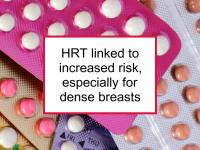A new study has reported that postmenopausal women with high breast density are at increased risk of breast cancer, and that this risk is heightened when using hormone replacement therapy (HRT) or menopausal hormone therapy. The study was designed to examine the links between density, risk and aggressiveness.
The study included 587,369 women who underwent 1,349,027 screening mammograms, of whom 14,090 were diagnosed with breast cancer. Five-year breast cancer risk was calculated, taking into account the women's breast density (as measured by the Breast Imaging Reporting and Data System (BIRADS)), menopausal status, age, and current HRT use.
Study results
Risk of breast cancer was found to be low for women with low breast density (BIRADS-1). Among women aged 55 to 59 years with low breast density, the five-year risk was just under 1% both for non-HRT users and for estrogen and estrogen plus progestin HRT users. On the other hand, the risk of breast cancer was relatively high among women with very high density (BIRADS-4), particularly for estrogen plus progestin users. Among women age 55 to 59 years with high breast density, the five-year risk was 2.4% for non-HRT users, 3.0% for estrogen only users, and 4.2% for estrogen plus progestin users.
The risk of advanced stage (IIb, III, or IV) compared to early stage (I or IIa) breast cancer was also calculated in relation to breast density. The risk of advanced-stage breast cancer was 1.7 times higher for HRT users with very high density compared to those with average breast density (BIRADS-2).
The authors conclude that postmenopausal women with high breast density are at increased risk of breast cancer and should be aware of the added risk of taking HRT, especially estrogen plus progestin.
